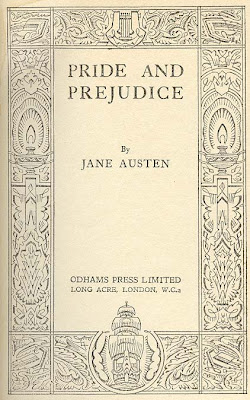 I was re-reading Jane Austen’s Pride and Prejudice, and toward the end I was struck by one line of dialog: “I could not have parted with you, my Lizzy, to anyone less worthy.” It is generally accepted that Mr. Bennet is saying that Mr. Darcy is most worthy to marry Elizabeth. But, given everyone’s prior bad opinion of Mr. Darcy, imagine if Mr. Bennet were really saying that of all the men Elizabeth could marry, none are less worthy of her than Mr. Darcy. Taken entirely out of context, that is an entirely reasonable interpretation of the line, isn’t it?
I was re-reading Jane Austen’s Pride and Prejudice, and toward the end I was struck by one line of dialog: “I could not have parted with you, my Lizzy, to anyone less worthy.” It is generally accepted that Mr. Bennet is saying that Mr. Darcy is most worthy to marry Elizabeth. But, given everyone’s prior bad opinion of Mr. Darcy, imagine if Mr. Bennet were really saying that of all the men Elizabeth could marry, none are less worthy of her than Mr. Darcy. Taken entirely out of context, that is an entirely reasonable interpretation of the line, isn’t it?
Being a longtime student of words and the way they are used, I often find myself struck by things like that. The curse of this is that I cannot hear anyone speak but that I hear all sorts of puns in what they say. I’ve learned to bite back my compulsion to point these out in some humorous way, as I’ve discovered for the most part I’m the only one in the room who finds them funny. Some of my favorite books and movies often contain such puns, and needless to say I am a devoted Monty Python fan.
In critique group once, we read an excerpt in which our heroine climbed aboard a motorcycle behind her love interest and wrapped her arms around his waist. “She felt something hard protruding from under his belt buckle.” The author couldn’t understand why we all started giggling – he meant, of course, and in the next sentence clarified, that it was a gun tucked in his belt. This is why we have others read our work, to catch such inadvertent flubs.
I’m sure I’m not the only one who has experienced the backlash of an email, whether sent to me or by me, that was not artfully crafted and comes as off-putting in any number of ways. I’ve gotten emails from friends that struck me as officious and intrusive; other times I’ve sent emails that hurt or angered the recipient by their terseness, when I though all I was doing was dashing off a quick note to a friend. In an office setting, I finally stopped sending emails at all, but just walked to the other person’s office and spoke to them in person – somehow the exact same sentiment, expressed verbally, is often taken better.
Readers bring all sorts of baggage to the table when they set to reading our work. Tone cannot be easily conveyed by the written word, and so we are left with context to shed light on the tone of our narrative and dialog. In the example above from Pride and Prejudice, it is clear from context that Mr. Bennett is happy for Lizzy, and from that we can infer the true meaning of the line quoted.
I love to laugh, and so would enjoy reading in the comments below any examples you have where imprecise language has led to confusion.

thanks for your insight. It is said that the deaf are more compromised in their ability to understand than the blind due to the lack of auditory clues.To carry on a conversation over text that includes any emotion at all is to invite misunderstanding and distrust, I’ve noticed. nice observation about the need to have others read what we have written.